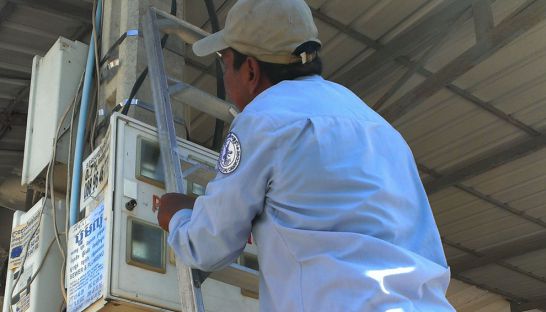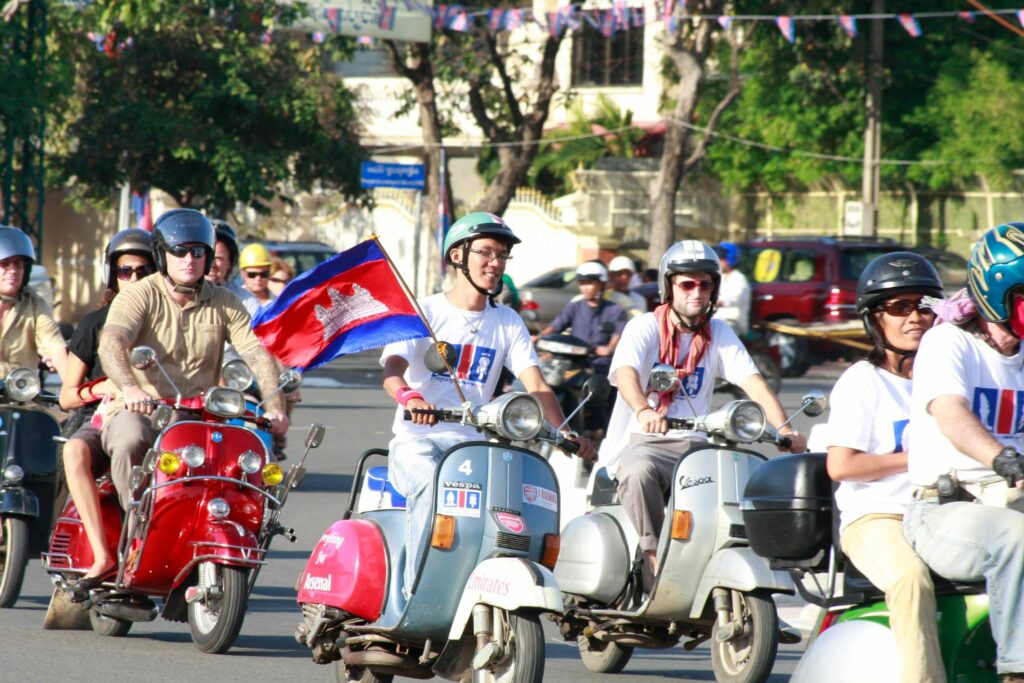Unofficial Translation from The Phnom Penh Post’s Khmer edition
TUESDAY, 3 MARCH 2015,
TONG SOPRACH
ភ្លើងអគ្គិសនីអាចចូលរួមកាត់បន្ថយការរំលោភលើស្ត្រី

To celebrate, the upcoming International Women’s Day, the eighth of March, the Cambodian government will reveal data and information about its achievement in combatting woman abuses. It will also illustrate the commitment to helping women gain self-confidence in both national and sub-national levels, enhance the role of women in enterprises and other institutions, improve women’s education and health and to combat all forms of abuses against women such as domestic violence, rape and sexual harassment.
The government has put great effort in minimizing the price of electricity in the houses rented to factory workers for the promotion of womens’ welfare. However, should the government contribute more to improving and expanding the existing street lights network in order to deal more effectively with all forms of abuses against women? This is a new safety aspect that can prevent women from violence, and we or the Government should more attention to family, community and public places. In more detail, how is electricity related to women’s security?
According to the research report from Actionaid organization on women and city that was published in 2011, it shows “the women factory workers, who live in darkness resulting from the shortage of electricity, are vulnerable to theft, robbery, sexual harassment, verbal abuse and sexual abuse. Some of them complain about their travelling in the dark as they come home from work, and they will be helpless when bad things happen.”
The new discovery of the dangers faced by women due to the lack of electricity has been supported by evidence of reality. For instance, a man was beaten to unconsciousness by a ring of gangsters and his girlfriend was gang-raped as they were travelling in a dark corner along Hanoi street of Khan Sen Sok in Phnom Penh.
Similar cases also happened in the previous month when a 30-year-old female cleaner, who herself told me her story, was surrounded by 6 people on two motorcycles while she was cycling to work early morning around 5 am in the area near Phnom Penh International Airport as usual. Scared and worried due to the lack of lights in the public streets and in the front of the houses, she could have been harmed if she had not sped up and reached a gasoline station where there were a few people. It was a while before those wicked people left”.
The ones who are the most vulnerable to the dangers caused by the lack of electricity are entertainment workers and female street cleaners, who leave from or go to work at dawn. They could be the victims of rape or sexual harassment.
Despite the slight decrease in visual tendency of domestic violence, from one woman out of four to one out of five (MOWA, 2011), the annual report in 2014 from the Ministry of Interior showed that rape cases increased by 5 percent, compared to the previous year, with 226 in 2014 and 215 in 2013. These data included only the cases within the list of police interventions. How about the unreported cases? The sex worker who is gang-raped by her male customers in groups “Bauk” every day, will likely never scream for help because she is afraid of more violence f those gangs nor file a complaint to the police as they might use the anti-human trafficking law to corrupt from these entertainment workers or even worse, police can take advantage of their extreme vulnerability by raping those victims.
Plus, the court usually gives light sentences to gang-rapists; for example, the three men who raped an under 15 years old girl in Khan Sen Sok, one of them got only 2 and a half years. Did the court gain something from his family? The sentences should range from 7 to 15 years in prison, according Article 240 which says, “The offenders shall be sentenced to imprisonment from 7 to 15 years if the offense is committed by several people who held the rank of perpetrators or accomplish”. Giving light punishment to rapists would prevent them from giving up their evil, and they could be still standing in the dark places and waiting for their next victims of sexual harassment.
In conclusion, although Alex was forced by the authorities to leave Cambodia last week because he opposes to the construction of the hydroelectric dam in Areng Area and many dams operate in Cambodia, the electricity is still costly and insufficient, and no one has brought up the right reasons or justifications for it. When will the government add more lights to the street so that women and children can feel safe and protected from violence, rape and harassment? Is it not better than wastefully leave it on during the day? Apart from that, lighting makes our city more beautiful. Khan Doun Penh of Phnom Penh, for example, has gained three Roumdul flowers (mitrella mesnyi flower) award for beauty because it does not have any dark places left in its territory. Why can the others not do that? The community, nevertheless, can also contribute to this issue. Each family in the community should turn on the light in front of their house to make their neighborhood safe for the female members as well as the other women. They can use the light bulbs that consume less electricity if the costs of that seem too expensive to them.
Tong Soprach is a social-affairs columnist for the Post’s Khmer edition.
Comments: [email protected]
